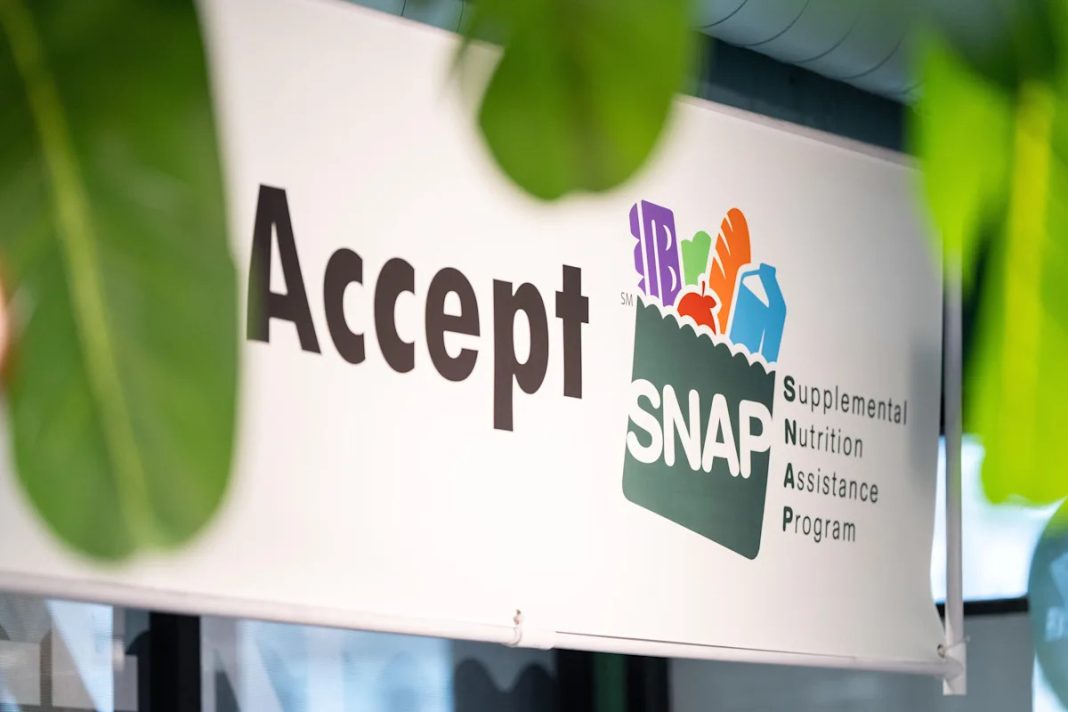Washington — The Justice Department on Friday asked the Supreme Court to freeze a lower court order that requires the Trump administration to swiftly provide full federal food benefits to roughly 42 million Americans, turning to the high court for emergency relief shortly after a federal appeals court left the decision in place.
Absent any 11th-hour emergency relief from the Supreme Court, the U.S. Department of Agriculture will have to take steps, for now, to cover in-full payments for the Supplemental Nutrition Assistance Program by the end of the day Friday. The administration said it has already exhausted the entirety of a more than $5 billion contingency reserve, which held enough to provide partial food assistance payments for the month.
Earlier Friday, the 1st Circuit denied the administration’s request for a temporary administrative stay, and said in its brief order that it is still considering the Justice Department’s bid for longer relief while it considers the appeal. Moments later, the administration turned to the Supreme Court.
“The core power of Congress is that of the purse, while the Executive is tasked with allocating limited resources across competing priorities,” Solicitor General D. John Sauer wrote in the emergency appeal. “But here, the court below took the current shutdown as effective license to declare a federal bankruptcy and appoint itself the trustee, charged with picking winners and losers among those seeking some part of the limited pool of remaining federal funds.”
A USDA official notified states earlier Friday that it was working to comply with the district court’s order to provide in-full the food benefits to Americans enrolled in SNAP for November.
The Justice Department had asked the 1st Circuit to intervene earlier Friday and sought a stay of the order from the federal court in Rhode Island by 4 p.m.
The 1st Circuit’s decision and the emergency appeal to the Supreme Court are the latest developments in the legal battle over SNAP benefits that has unfolded over the past several days. The payments are used by recipients to purchase groceries, but the USDA said late last month that assistance for November would not go out because of the ongoing government shutdown.
A group of cities and nonprofit organizations sued the USDA last week amid rising concerns that the lapse in payments would leave millions of low-income Americans hungry. U.S. District Judge John McConnell, who is overseeing the case, then ordered the Trump administration to dip into a contingency fund to provide food aid to the roughly 42 million Americans enrolled in the program for November.
The administration told the court Monday that it would comply with that order but said there was only enough reserve money to provide partial SNAP benefits. The USDA sent states the information needed to calculate the reduced payments to eligible Americans on Tuesday, but warned it could be weeks before the assistance reaches recipients.
The plaintiffs then asked McConnell for additional relief that would require the Trump administration to make full SNAP payments “immediately.”
In a decision Thursday, McConnell accused the government of undermining the “intent and the effectiveness” of his earlier order to distribute the aid to SNAP beneficiaries as soon as possible. He pointed to a social media post from President Trump on Tuesday, in which the president said benefits would be given “only when the Radical Left Democrats open up government, which they can easily do, and not before!”
Amid confusion as to whether the president was signaling the administration would not follow McConnell’s initial order to use the contingency funds, the White House clarified that it is complying with it.
Still, the judge said the Trump administration had to provide the full SNAP payments and pull from two sources — the contingency fund and a different pot — to do so. McConnell said comments from administration officials indicate that food benefits are being withheld for “political purposes.”
In seeking emergency relief from the 1st Circuit, the Justice Department claimed that the judge’s order “makes a mockery of the separation of powers” and directed the USDA to find $4 billion “in the metaphorical couch cushions.”
Trump administration officials have said there was $4.6 billion available in the contingency fund to cover a partial allotment for November, and would need $9 billion to provide the full amount of SNAP benefits.
Justice Department lawyers wrote in a filing that the judge’s order to transfer funds from the second source of money would require it to divert billions from Child Nutrition Programs, which provide food assistance benefits to millions of children.
“Unfortunately, by injecting itself with its erroneous short-term solution, the district court has scrambled ongoing political negotiations, extending the shutdown and thus undercutting its own objective of ensuring adequate funding for SNAP and all other crucial safety-net programs.,” they said.
In the filing with the Supreme Court, Sauer said that if left in place, McConnell’s decision “will metastasize and sow further shutdown chaos.”
“To comply with yesterday’s abrupt TRO, the government must transfer billions of dollars to SNAP and send that money to the States by tonight,” he wrote. “Once those billions are out the door, there is no ready mechanism for the government to recover those funds — to the significant detriment of those other critical social programs whose budgets the district court ordered the government to raid.”
But lawyers for the cities and nonprofits claimed to the appeals court that Trump administration officials “callously disregard” the harm to them and millions of Americans if assistance is provided below the full level.
They urged the 1st Circuit to not let the Trump administration “further delay getting vital food assistance to individuals and families who need it now.”
Trump says government shutdown was “a big factor” in GOP election losses
Man says he was trapped by fire surrounding auto shop after UPS plane crash
Government shutdown forces major flight cuts as judge orders Trump administration to pay SNAP

